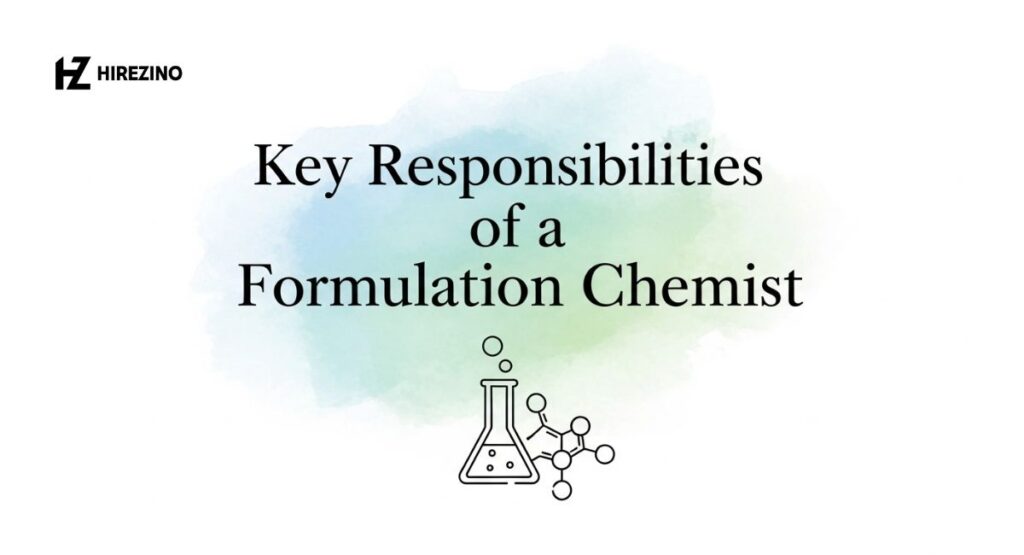Formulation work is an exciting and vital facet of chemistry – critical in the development of products we use every day from medicines to cosmetics to foodstuffs. Chemists having skills in formulation science works with chemicals to develop products that meet each of these wants for everyone. The science of formulating chemistry demands an in-depth understanding of how different chemicals work together and exact measurements to ensure that products meet certain specifications. Whether it’s science behind the development of pharmaceutical formulations or emerging beautiful products, formulation work is intended to make sure you are getting the final product that meet your specific needs without compromising on quality.
Besides its importance in areas like pharmaceuticals and cosmetics, formulation work is equally important in food science, chemical engineering and industrial coatings. It’s the science of mixing chemicals to form safe, dependable and novel products. Formulation chemists help to innovate what we use and do everyday with the assistance of chemical analysis, continuous testing and proven processes.
Introduction to Formulation Chemistry
Specialty formulations are the art of mixing chemicals together to make useful products. Formulation work is used to create pharmaceutical formulations, cosmetic formulations and food products. It’s a science that just combines things in a certain way, for the desired affect. Following this procedure causes the safety, the quality and the functional performance of products.
Formulating is all trial and error, and research. Formulation chemists must know about chemical properties and how they interact. The aim is to develop something that functions correctly. That is why formulation chemistry work matter so much in everyday products.
Key Responsibilities of a Formulation Chemist

A formulation chemist’s primary responsibility is developing a chemical formula that works for the product. They combine chemical compounds to make safe and effective products. Formulation work is generating new formulas, evaluating them and making them better. Formulation chemists also verify that the products conform to safety guidelines.
Product testing is another big part of their job. Formula goes live and formulation chemists then test the effectiveness. They check that the product actually works as it’s supposed to and is safe for consumers. Safety first when working on formulation work like this, always of course.
Essential Skills Required for a Formulation Chemist
There are a couple of key skills you need to be a good formulation chemist. You’ve got to know about chemical compounds and how to mix them. Chemists will also need to be good at math, so that they can predict how ingredients are going to combine. Formulation/batch chemists should also have good problem-solving skills to make corrections to the product’s formula.
Also, formulation chemists must be able to operate lab equipment for chemical analysis and product testing. They should also be current in formulation science. This allows them to develop more innovative products through more effective formulation work.
Educational and Training Requirements for Formulation Chemists
Education Required to Become a Formulation Chemist To be eligible for jobs as formulation chemists, you would need to have completed graduation in chemistry or even chemical engineering. Formulation chemists are generally required to have at least a bachelor’s degree in chemistry. Some eventually go on to get master’s degrees in formulation science or cosmetic formulation.
Hands on experience is equally important with the education. Hands-On Experience with Formulation Chemists Some formulation chemists get this experience through internships or laboratory work. It’s a way for them to learn chemical synthesis, chemical testing and other features of formulation work.
Specializations in Formulation Chemistry
Formulation chemists can also have a variety of specialties. Some are employed in pharmaceutical development, focusing on pharmaceutical formulations. Others may focus on cosmetic development, developing skincare and beauty lines. There are also openings in such areas as food science and chemistry, where chemists develop the safety and taste of food products.
There are both disciplines which requires a good knowledge of chemicals, chemical compounds and mixtures as is obvious. Cosmetic Chemistry and Formulation Science allow the chemist to provide excellent product offerings across a spectrum of industries.
Formulation Chemist Job Outlook and Salary
Formulation Chemist Job Opportunities The future is bright for Formulation Chemists. With the progress of industrialization,chemists work in the fieldarenow required increasingly. Formulation Chemist – typically $60,000 – 100,000 depending on experience and industry. People working in pharmaceutical and research & development (R&D) tend to earn more.
With an increasing demand for pharmaceutical formulations, cosmetic formulations and consumer goods chemistry over the years to come we believe that formulation chemists will be more in demand. The industry provides great levels of job security and career growth possibilities.
How to Become a Formulation Chemist
If you would like to become a Formulation Chemist, begin by earning a degree in chemistry or chemical engineering. You’ll also need real-world experience, which you can get through internships or working in a lab. Solid understanding of chemical properties and product testing is required.
Many of the formulating chemists receive advanced training. Animal Formulators can specialize in cosmetic formulation or pharmaceutical product development to specialize in an area of formulation work.
Career Pathways and Advancement for Formulation Chemists

Career pathways A career as a formulation chemist will generally begin with an entry-level position, such as junior chemist. You may be able to move up to positions such as senior chemist or lab manager as you gain experience in formulation work. Some formulatory chemists choose more specialization or go into R&D.
At the entry level, experience, specific training and further education frequently are required for professional advancement. Other areas to consider include product development and quality control, as formulators work to make certain that products are safe and meet specific quality standards.
Top Industries Employing Formulation Chemists
Formulation chemists can be found in many different fields. One of the largest employers in this industry is the pharmaceutical companies specifically those who design medications. Another important industry is cosmetic formulation, in which formulation chemists develop skin care products, makeup and hair care products. There are jobs in food science and chemistry, where chemists create food and drinks using the correct ingredients.
Formulation chemists are also employed in areas such as consumer chemistry, chemical production and industrial coatings. New Product, New Demand: New product and the demand forfor mulation chemists.
Tools and Technologies Used by Formulation Chemists
Chemists, in order to do formulation work, depend on a variety of tools and technologies. Lab tests are needed to test and improve formulas. Equipment such as spectrometers and high-performance liquid chromatography (HPLC) allows chemists to test chemical compounds and maintain product quality.
Technological breakthroughs are also a huge part of the modern formulation work. The software tools for chemical synthesis and product testing methods result in greater efficiency during the formulation process. These tools guide formulation chemists in how various combinations of ingredients will behave before physical testing is done.
Work Environment and Daily Life of a Formulation Chemist
Formulation chemists are employed in labs, factories and research and development (R&D) centers. Day to day, they design new formulas, test prototypes and analyze data. Formulators frequently work with other chemists, engineers, and product developers to meet the safety and performance specifications for the products.
The work environment can vary. Some formulation chemists work quietly away in a laboratory while others may spend much of their day in manufacturing plants monitoring the progress of their formulation on the flow line. In any environment, it’s a job of focus, accuracy and high-level expertise in the properties of chemicals.
Conclusion
Formulation is not only at the heart of chemistry, but also behind products that shape our everyday lives. Whether it is the pharmaceutical formulations that allow drugs to treat disease and save lives or the cosmetic formulations that make up your personal care products, formulation work affects all industries. By combining science, innovation and creativity, formulation chemists make new ideas happen, creating a world with safer and better products. The value of formulation work goes far beyond individual industries — it is an underpinning of world progress, driving better health, appearance and safety in everything from our medicine to what we eat, from how we look to how products perform or are produced. Without formulation work, many of the products we use today would not exist in their current or effective forms.
The profession offers a variety of job opportunities for people who would like to focus on formulation work and formulation chemistry. From growing new frontiers in the pharmaceutical space, cosmetic chemistry to food sciences, there are so many directions you could take if you’re passionate about formulating chemicals. An abundance of different industries that require the use of a formulation chemist can lead to this group of professionals finding their own unique place in the ever-changing landscape this complex field presents. With the proper education, training and hands-on experience, you can embark on a rewarding career in formulation chemistry and help shape the style of science developed products for the next generation. As you progress through the course, you can specialize in specific areas, such as pharmaceutical formulations or sustainable formulations – essential to our planetary future. Formulation work is a career that continues to grow, and with every new development you’ll help make the world a better place.
FaQs
What is a formulation job?
A formulation job involves designing and testing products by combining various chemical compounds to meet specific safety and effectiveness standards.
What is an example of a formulation?
An example of a formulation is the creation of a pharmaceutical formulation such as a tablet or a cosmetic formulation like a moisturizer.
What is formulation skill?
Formulation skill refers to the ability to understand and combine chemical compounds effectively, along with knowledge of testing and improving product formulations.
What does a formulator do?
A formulator designs and tests products, ensuring that the right ingredient combinations are used to create effective, safe products.
What education do you need to be a formulator?
To become a formulator, you typically need a degree in chemistry or chemical engineering, along with specialized training in formulation science.
What do you mean by formulation in pharma?
Formulation in pharma refers to the process of designing medications by combining chemical compounds to ensure they are safe, stable, and effective for patients.

